On the afternoon of 13 May, the meeting had resolved, with no dissent, that some sort of continent-wide boycott was the solution to the crisis.
Over the next couple of sessions, the meeting kept asking for its committee to recommend a specific plan. Thomas Cushing kept replying that the committee didn’t yet have a report. Then the town would ask the committee to “sit again”—i.e., get to work.
On 30 May, the town meeting spelled out what it wanted by voting:
That the Committee appointed to receive Proposals & consider of Ways & Means, be desired to prepare a Paper, to be carried to each Family in the Town, the Report of which to be, not to purchase any Articles of British Manufactures, that can be obtained among Ourselves, & that they will purchase Nothing of, but totally desert those who shall Counter-work the Salutary Measures of the Town.The meeting also said that the next session would be on 17 June. The committee shouldn’t expect any more guidance until then.
Voted, That the Comittee of Correspondence be & hereby are directed, to comunicate the Non Consumption Agreement aforesaid to the other Towns in the Province.
The committee of correspondence acted on 8 June. Town clerk William Cooper sent out a two-page printed letter to rural towns that began:
GENTLEMEN,How the committee got from trade restrictions to “our religious liberty” isn’t at all clear, but they definitely played on New England’s religious sentiment and tradition.
THE evils which we have long foreseen are now come upon this town and province, the long meditated stroke is now given to the civil liberty of this country? How long we may be allowed the enjoyment of our religious liberty is a question of infinite moment. . . .
Boston’s letter said the people of Massachusetts should “universally come into a solemn league, not to import goods from Great Britain, and not to buy any goods that shall hereafter be imported from thence.” That phrase “solemn league” echoed the name of an agreement from 1643, early in the English Civil War. The actual agreement the committee sent included another word from that original, “covenant.” As a result, this boycott agreement came to be known as the Solemn League and Covenant, usurping that label from the earlier document.
On the day Cooper sent his circular letter, Cushing, Samuel Adams, and other elected politicians were in Salem for a session of the Massachusetts General Court. Perhaps Cushing’s caution and Adams’s savvy might have moderated the committee’s call for a boycott, or at least toned down the language. Or perhaps those leaders had signed off on the drafts before going to Salem.
In any event, some people thought the committee had gone too far.
TOMORROW: Complaints in and out of town.

No comments:
Post a Comment